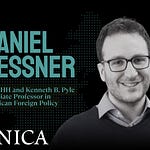This live Sinica Podcast recorded in New York on March 6 features Samm Sacks, Cybersecurity Policy and China Digital Economy Fellow at New America. She and Kaiser Kuo discuss the many facets of U.S.-China technology integration and competition, touching on topics such as data security, artificial intelligence, and how to build “a small yard with a high fence.”
What to listen for on this week’s Sinica Podcast:
11:04: Decoupling is a theme that has defined one of the more extreme potential outcomes of the fraying U.S.-China relationship. Are these conversations prevalent outside of Washington? What about the Silicon Valley tech community? Samm addresses these questions here, among others: “The reality is when we think about technology development, whether it’s joint research, supply chains, collaboration of sciences — these things don’t really map nicely onto political borders. And these are really diffuse networks that, when you try to decouple [them], there’s just a disconnect here.”
21:13:What is the relationship between technology companies and the Communist Party? What impact does China’s Cybersecurity and National Intelligence Law have on the companies’ supposed obligations to cooperate with authorities on sharing private data? When two passengers using Didi, a popular ride-share service in China, were killed, the company cooperated reluctantly, resulting in a bizarre legal limbo. Samm explains: “Chinese legal scholars were saying, wait a second, if Didi is to fall in line on this data-sharing agreement, that’s a violation of China’s Cybersecurity Law, because the Cybersecurity Law has a framework around the conditions where data is collected and shared. So again I think there’s a lot more churn than people understand.”
27:46: What is important data? China’s Cybersecurity Law has outlined broad data localization requirements. Does the government have the ability (or capability) to review the huge amounts of data going in and out of the country? Samm points out: “One of the outcomes I would look for if we were to see the so-called structural issues on the tech side, one would be is the Chinese government going to agree to allow more kinds of commercial data out of the country without these arduous security audits?”
34:41: Is China deliberately exporting its model of censorship to governments and countries throughout the world? What of the future of domestic surveillance in China? Who is discussing the ethical and legal implications of artificial intelligence being brought into everyday life and society, and where? Samm attended a Track 2 dialogue between Berkeley Law and Beijing University Law and discusses the conversations in the academic world regarding algorithmic bias, and contesting decisions made by artificial intelligence here.
40:58: Samm elaborates on the concept of “small yard and high fence.” What are some actionable items in the technological tussle unfolding between Washington and Beijing? She provides her guiding principle: “Having a constructive bilateral trade and investment relationship with China, particularly with technology, is in the interest of the United States. And we cannot take an approach that is going to use blanket bans and discrimination based on national origin. We need to use tools like law enforcement as the scalpel they were intended to be because of the integration of our two systems. Otherwise, we end up shooting ourselves in the foot.”
Recommendations:
Kaiser: Seeing Like a State: How Certain Schemes to Improve the Human Condition Have Failed, by James C. Scott.
Samm: Catastrophe, a British sitcom available on Prime Video.
This podcast was edited and produced by Kaiser Kuo and Jason MacRonald.
See Privacy Policy at https://art19.com/privacy and California Privacy Notice at https://art19.com/privacy#do-not-sell-my-info.












